If There Was One Thing I Could Get Neurotypicals To Understand It Would Be This:
If there was one thing I could get neurotypicals to understand it would be this:
The thing that is frustrating you about me is frustrating me far more than it could ever frustrate you. I know when I’m not functioning. I know when I’m falling short. I know when I’m falling apart. I also know that it takes a lot to regain the confidence of someone else once it has been lost, so I know I’m going to have to work harder than ever, and that is an exhausting thought for me, more than you could possibly imagine. It’s not your problem. I know that, and I don’t expect any special treatment. I’m not stupid. Just know that I know.
More Posts from Souppooppie and Others
self-inserts are so good!! i love seeing them!! please don't be scared to post your self-insert art or story or just a conversation you had in your head with a certain character!! we're different people and it's great how we interact with our favorite characters in different ways!!
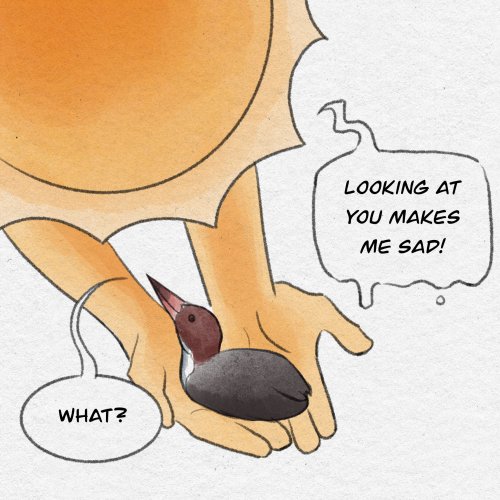
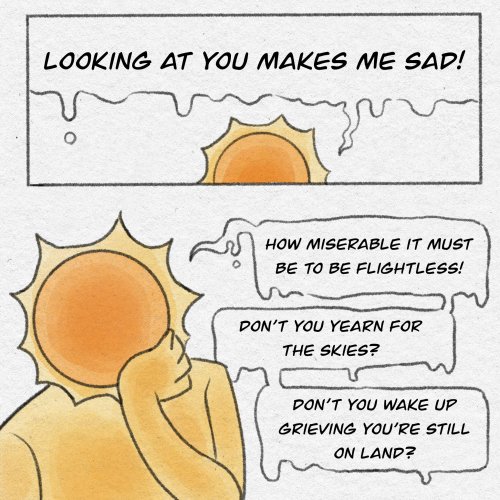
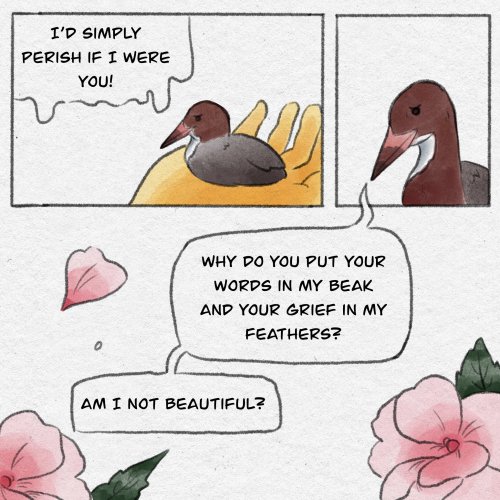
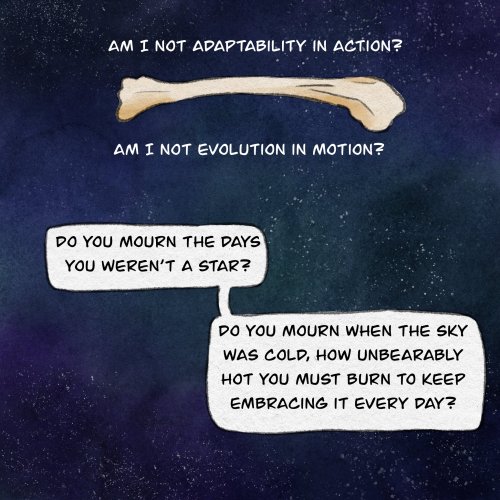
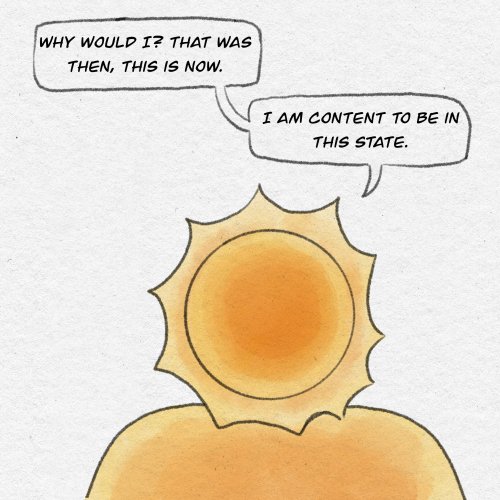
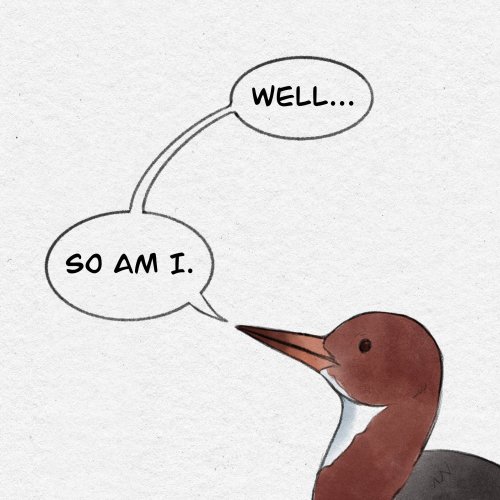
the sun mourns in vain for the white-throated rail: a comic about disability and the unwanted able-bodied grief for past selves.
[IMAGE DESCRIPTION:
Page 1: The sun holds a white-throated rail, a bird with a red head, a gray body, and a white throat, in its hands. The sun speaks in a tone represented as sorrowful pity through a drippy speech bubble.
Sun: Looking at you makes me sad!
Rail: What?
Page 2:
Sun: Looking at you makes me sad!
The sun stands with a hand clutching its face.
Sun: How miserable it must be to be flightless! Don’t you yearn for the skies? Don’t you wake up grieving you’re still on land?
Page 3: The white-throated rail looks down in frustration in the hand of the sun.
Sun: (speaking off screen) I’d simply perish if I were you!
The rail speaks, looking down. Pink flowers bloom towards the bottom of the page, petals and pollen blowing in the wind.
Rail: Why do you put your words in my beak and your grief in my feathers? Am I not beautiful?
Page 4: The bone of a white-throated rail is positioned against a colorful galaxy dotted with flecks of stars.
Rail: Am I not adaptability in action? Am I not evolution in motion? Do you mourn the days you weren’t a star? Do you mourn when the sky was cold, how unbearably hot you must burn to keep embracing it every day?
Page 5: The sun looks at the viewer.
Sun: Why would I? That was then, this is now. I am content to be in this state.
Page 6: The rail looks up at the sun off-screen.
Rail: Well…So am I.
Ways I develop character relationships in my writing
This is just a small list of things I do to add a little bit of coziness into my writing through my characters! Relationships (both platonic and romantic) are notoriously hard to write, so here are some of my tips!
Characters picking up on each other’s mannerisms
Characters finishing each other’s sentences
When one character trips/falls/slips and their friend(s) make fun of them before helping them up
Inside jokes
When a group is laughing together, characters who immediately look at each other to see if they found it funny also
Friends who can’t keep it together in serious situations when they’re together
Platonic touching (hugging, hand holding, high fives, etc.)
Characters discussing future plans
Intentionally making fun of each other in front of their crush/partner

It feels so silly and embarrassing to still feel sad of the things that happened in your childhood when you're of adult age.


Sleeping Sasha - Lena Rivo
Spanish,
Gouache , 16 x 28 cm.
What can Magical Girl Shoujo and Action Hero Shounen manga/anime tell us about perceptions of womanhood and manhood? And how different priorities for genders get expressed in media
Let’s imagine a typical Magical Girl Shoujo anime. It usually starts with a normal girl, on the cusp of puberty or a teenager, who suddenly discovers some magical artifact or innate part of herself that connects her to a magical destiny. There is usually no choice in the matter; she is (along with some select friends) the only one who can do the magical move that prevents demons/aliens/enemies from destroying her home (or even the whole earth). Her status as a magical hero is not one that’s earned, but rather a responsibility thrust upon her.
Meanwhile Action Hero Shounen tends to be about a boy, also often on the cusp of puberty or a teenager, who goes on a deliberate journey to attain a particular status or power. In some cases he may get one advantageous power at the start, but it’s usually up to him to make it useful and achieve his dream. His story often involves trials, tournaments, and intense battles that slowly ramp up until he becomes the most powerful (or achieves whatever status he dreamed of). That status is one that is earned, not given.
Do these differences sound familiar? If so, you may know about the theory of Precarious Manhood (Vandello & Bosson 2013 has great coverage on the subject). The theory suggests that womanhood is secured (or forced) naturally as a girl grows up; she just is a woman, and that status is generally not called into question on a regular basis. Meanwhile manhood is something that must be earned and can be easily lost; a man must continually “prove” his masculinity to maintain that he is a man. We see this reflected in the two genres I described: The Magical Girl just is the hero, while the Action Hero must become the hero. These genres are targeted towards the demographic of their main characters, kids and teens, and they reflect the values, struggles, and anxieties those demographics carry.
The Magical Girl genre focuses on a lot of girls' fears about growing up—there’s a sense of power that comes with it, but it comes at a cost. The conflicts in these shows often aren’t centrally the monsters or battles, but rather interpersonal dramas and work-life balance. To a teenage girl, having a friend group falling out can feel catastrophic, reflected in how a Magical Girl may cause a literal catastrophe unless she can get everyone to work together to defeat an enemy. Another huge conflict is balancing saving the earth and maintaining friendships, romance, work, and grades. Lots of girls get pulled in many directions at this age, and if one is expected or needs to help out around the home she has yet another responsibility on her plate that makes time management a relevant issue.




Within the Action Hero genre the fears and issues are of a different variety. There’s a focus on continual growth, best friends, and achieving milestones. Conflicts generally come down to power struggles, though there’s often an emotional component as well. The deciding factor is often willpower, or how much effort (regardless of the danger to his own safety) a boy is willing to put in to beat an enemy. At this age friendships are often built on sports, games, and competition, and there’s many anxieties about being “manly” enough (or sometimes just not wanting to be feminine because of the mockery that entails).


The differences in the genres clearly reflect gender norms/anxieties regarding femininity and masculinity for their demographic… and also enforce them. Girls are taught that their job is not to reach out and take power, but instead to play a careful balancing game with whatever power/responsibilities they are given (though it's notable that in these magical stories, they happen to be given huge power to work with). Boys are taught that they must wear themselves out, constantly putting themselves in danger and forcing their limits if they want to feel like they have worth or to "be a man".
What would challenging or reversing these expectations be like? Hmm…
Sailor Moon, with Action Hero Conventions
Usagi is just a normal clumsy girl, but one day she sees a cat being harassed by some kids on the way to school. She saves the cat, discovers her name is Luna, and that she’s actually from another planet! There is a secret elite task force, known as the Sailor Scouts, who fight against aliens trying to take over the earth. Luna says that she came to Earth to look for a human who she could train to defeat the evil Queen Beryl, which will also earn the human the right to be the next ruler of the moon. Though Usagi finds it strange and a little scary, when some of Queen Beryl’s minions come down to earth and endanger her friends, she decides to begin her quest to become a Sailor Scout! She’ll have to learn to be more coordinated and pass the Sailor Scout exam first, then battle with other Sailor Scouts to convince them to join her party, but eventually she’ll build up the power and strength to take on Queen Beryl and to become the Queen of the Moon!
Hunter x Hunter, with Magical Girl Conventions
Gon is just a normal boy who loves nature. As he is walking through the woods one day, he meets a mysterious tall man, Kite. Kite says he recognizes him; he knew Gon’s father and knows that Gon has inherited something important: The blood of a Hunter, AKA someone fated to be a guardian of the island he lives on. He has also inherited a special move: “Rock”, a magical punch that can break through anything. There are a few other Hunters Gon must find, add to his party, and work together with to defeat the Phantom Troupe, an evil group with great powers who are trying to invade his peaceful island. Gon is excited to be a Hunter like his father, but right now he lives with his aunt who hates Hunters, so he has to sneak around when protecting his island so she doesn't find out! It’s hard to balance being a normal kid and protecting his island, but with his new friends he hopes to do it all!
These are obviously simplifications of the plots of Sailor Moon and HxH, but it’s an interesting thought experiment. How would girls feel about a plot where a girl has to build up her powers and train? How would boys feel about a plot where the power/rank is almost never in question, but relationships and balancing responsibilities is? If you know any anime/manga that fit or challenge these patterns, I’d love to know your examples.
ok but imagine if Howl's motherfucking Jenkins is in the same room as Alex Russo. what do you think would happen
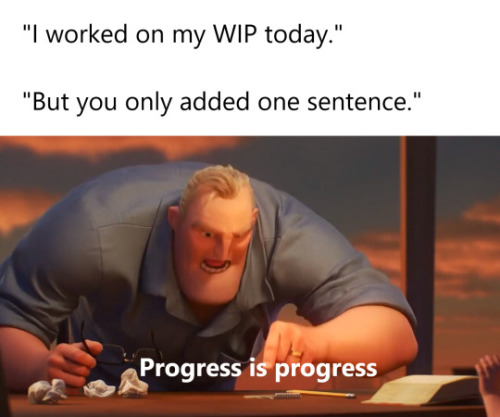
-
 weighted-raincoat reblogged this · 7 months ago
weighted-raincoat reblogged this · 7 months ago -
 lizzywondersblog liked this · 1 year ago
lizzywondersblog liked this · 1 year ago -
 mysteria81 liked this · 1 year ago
mysteria81 liked this · 1 year ago -
 knightmaiden liked this · 1 year ago
knightmaiden liked this · 1 year ago -
 typo-jay-memester-bowl-jr liked this · 1 year ago
typo-jay-memester-bowl-jr liked this · 1 year ago -
 goulsnightout liked this · 1 year ago
goulsnightout liked this · 1 year ago -
 flonightingayle liked this · 1 year ago
flonightingayle liked this · 1 year ago -
 that-disabled-princess liked this · 1 year ago
that-disabled-princess liked this · 1 year ago -
 weird-person-with-no-life liked this · 1 year ago
weird-person-with-no-life liked this · 1 year ago -
 wambatt liked this · 1 year ago
wambatt liked this · 1 year ago -
 insert-rwby-reference liked this · 1 year ago
insert-rwby-reference liked this · 1 year ago -
 otterlybeautiful liked this · 1 year ago
otterlybeautiful liked this · 1 year ago -
 janet-the-interplanet liked this · 1 year ago
janet-the-interplanet liked this · 1 year ago -
 weighted-raincoat reblogged this · 1 year ago
weighted-raincoat reblogged this · 1 year ago -
 hopefulmuglawyerathlete liked this · 1 year ago
hopefulmuglawyerathlete liked this · 1 year ago -
 literatemermaid liked this · 1 year ago
literatemermaid liked this · 1 year ago -
 droxtal liked this · 1 year ago
droxtal liked this · 1 year ago -
 bellanoor liked this · 1 year ago
bellanoor liked this · 1 year ago -
 the-sky-the-stars-the-sea reblogged this · 1 year ago
the-sky-the-stars-the-sea reblogged this · 1 year ago -
 the-sky-the-stars-the-sea liked this · 1 year ago
the-sky-the-stars-the-sea liked this · 1 year ago -
 dreamadove liked this · 1 year ago
dreamadove liked this · 1 year ago -
 revengeraven liked this · 1 year ago
revengeraven liked this · 1 year ago -
 wyrmtooth liked this · 1 year ago
wyrmtooth liked this · 1 year ago -
 rwintarou liked this · 1 year ago
rwintarou liked this · 1 year ago -
 cherry-dream-star liked this · 1 year ago
cherry-dream-star liked this · 1 year ago -
 43636 reblogged this · 1 year ago
43636 reblogged this · 1 year ago -
 slasherbuppy liked this · 1 year ago
slasherbuppy liked this · 1 year ago -
 oolorea liked this · 1 year ago
oolorea liked this · 1 year ago -
 lunarpunkradio liked this · 2 years ago
lunarpunkradio liked this · 2 years ago -
 skitterly liked this · 2 years ago
skitterly liked this · 2 years ago -
 aquaswayfinder liked this · 2 years ago
aquaswayfinder liked this · 2 years ago -
 tea-tties reblogged this · 2 years ago
tea-tties reblogged this · 2 years ago -
 tea-tties liked this · 2 years ago
tea-tties liked this · 2 years ago -
 amavasi reblogged this · 2 years ago
amavasi reblogged this · 2 years ago -
 blush-imeanteal reblogged this · 2 years ago
blush-imeanteal reblogged this · 2 years ago -
 shadowgeneralblog liked this · 2 years ago
shadowgeneralblog liked this · 2 years ago -
 squ1rrel-punk liked this · 2 years ago
squ1rrel-punk liked this · 2 years ago -
 cherivixenxo liked this · 2 years ago
cherivixenxo liked this · 2 years ago -
 animatedbooklover liked this · 2 years ago
animatedbooklover liked this · 2 years ago -
 levelsevenlaserlotus liked this · 2 years ago
levelsevenlaserlotus liked this · 2 years ago -
 luxiiien liked this · 2 years ago
luxiiien liked this · 2 years ago -
 mushroommortem liked this · 2 years ago
mushroommortem liked this · 2 years ago -
 luckiilotzz liked this · 2 years ago
luckiilotzz liked this · 2 years ago -
 trash-for-megane reblogged this · 2 years ago
trash-for-megane reblogged this · 2 years ago